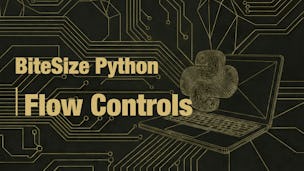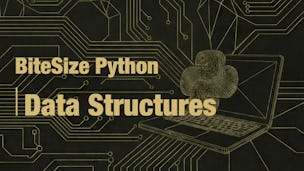Start your Python journey with this course, where you’ll gain a solid foundation in this powerful language. Learn how to work with variables and data types to store and process information, master operations to perform calculations and make comparisons, and unlock the power of strings for text manipulation. Through hands-on case studies, like creating a checkout system, splitting tips, and calculating compound interest, you’ll apply your skills to solve real-life problems. This beginner-friendly course is perfect for anyone looking to build practical coding skills and confidence in Python.

BiteSize Python for Absolute Beginners: Essentials

BiteSize Python for Absolute Beginners: Essentials
This course is part of BiteSize Python for Absolute Beginners Specialization

Instructor: Di Wu
Access provided by Coursera for Reliance Family
10 reviews
What you'll learn
Use Python programming fundamentals, including variables, data types, and basic input/output functions
Perform arithmetic, relational, and logical operations, and manipulate strings
Analyze and create Python programs to solve real-world problems
Skills you'll gain
Details to know

Add to your LinkedIn profile
6 assignments
See how employees at top companies are mastering in-demand skills

Build your subject-matter expertise
- Learn new concepts from industry experts
- Gain a foundational understanding of a subject or tool
- Develop job-relevant skills with hands-on projects
- Earn a shareable career certificate

There are 6 modules in this course
This module introduces the basics of Python, highlighting why it is a popular programming language and how to start learning it. It covers the differences between script and interactive Python, explains why iPython is preferred, and introduces Jupyter Notebooks as a powerful tool for coding. Additionally, it explores the distinctions between local and cloud-based coding environments, including the specific setup used in Coursera labs.
What's included
11 readings1 assignment
This module explores the basics of input and output in Python. Starting with the classic "Hello, World!" example using the print() function, it explains the differences between single, double, and triple quotation marks in Python. The module also covers how to print multiple values simultaneously and introduces the input() function to receive user inputs. Learners will see how to combine input() and print() to create simple interactive programs.
What's included
1 reading1 assignment6 ungraded labs
This module introduces variables in Python, including how to define them and the rules for naming them correctly according to syntax and conventions. It covers the fundamental data types—integers (int), floating-point numbers (float), and strings (str)—and explains how to convert between these types using Python’s built-in conversion functions.
What's included
5 readings2 assignments2 ungraded labs
This module focuses on the different types of operations in Python, including assignment, arithmetic, relational, and logical operations. It explains how to use these operations to manipulate data and make comparisons within Python programs, providing a foundational understanding of how data is processed and evaluated.
What's included
1 reading1 assignment4 ungraded labs
This module delves into the str data type in Python, covering everything from the basics of what a string is to how to create, access, and manipulate strings. It includes techniques for slicing, concatenating, and formatting strings, as well as an overview of common string methods that simplify text processing tasks.
What's included
2 readings1 assignment6 ungraded labs
This module applies essential Python concepts through practical case studies, demonstrating how to solve real-life problems using the skills learned in previous modules. The case studies include a checkout system for calculating total costs, a tip-splitting application to fairly divide tips among diners, and a compound interest calculator for financial planning.
What's included
1 reading3 ungraded labs
Earn a career certificate
Add this credential to your LinkedIn profile, resume, or CV. Share it on social media and in your performance review.
Instructor

Offered by
Why people choose Coursera for their career

Felipe M.

Jennifer J.

Larry W.

Chaitanya A.
Learner reviews
- 5 stars
90%
- 4 stars
10%
- 3 stars
0%
- 2 stars
0%
- 1 star
0%
Showing 3 of 10
Reviewed on Apr 30, 2025
Great format. Took me a minute to figure out the lab controls, but once I did I love it.
Reviewed on Mar 15, 2025
The content is straightforward and applies real life challenges.
Reviewed on May 27, 2025
Good class with a steay building of lessons and understanding.
Explore more from Data Science

University of Colorado Boulder

University of Colorado Boulder

